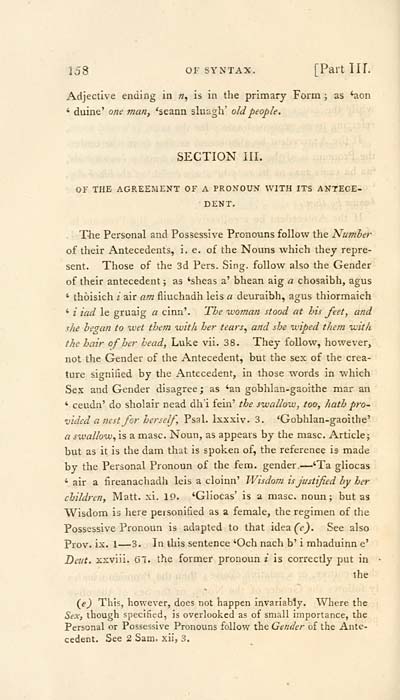Download files
Complete book:
Individual page:
Thumbnail gallery: Grid view | List view

158 OF SYNTAX. [Part II r.
Adjective ending in «, is in the primary Form ; as 'aon
* duine' one man, *seann sluagh' old people.
SECTION III.
OF THE AGREEMENT OF A PRONOUN WITH ITS ANTECE-
DENT.
The Personal and Possessive Pronouns follow the Number
of their Antecedents, i. e. of the Nouns which thej repre-
sent. Those of the 3d Pers. Sing, follow also the Gender
of their antecedent ; as *sheas a' bhean aig a chosaibh, agus
' thòisich / air am fliuchadh leis a deuraibh, agus thiormaich
' i iad le gruaig a cinn'. The woman stood at his feet, and
she began to wet them with her tears^ and she wiped them with
the hair of her head, Luke vii. 38. They follow, however,
not the Gender of the Antecedent, but the sex of the crea-
ture signified by the Antecedent, in those words in which
Sex and Gender disagree ; as 'an gobhlan-gaoithe mar an
' ceudn' do sholair nead dh'i fein' the swallow, too, hath pro-
vided a nest for herself , Psal. Ixxxiv. 3, 'Gobhlan-gaoithe'
a swallow^ is a masc. Noun, as appears by the masc. Article;
but as it is the dam that is spoken of, the reference is made
by the Personal Pronoun of the fern, gender. — 'Ta gliocas
' air a fireanachadh leis a cloinn' Wisdom is Justified by her
children. Matt. xi. 19. *Gliocas' is a masc. noun; but as
Wisdom is here personified as a female, the regimen of the
Possessive Pronoun is adapted to that ideaC^^. See also
Prov. ix. 1 — 3. In this sentence *Och nach b' i mhaduinn e'
Dent, xxvili. 67. the former pronoun i is correctly put in
the
(^e) This, however, does not happen invariably. Where the
Sex, though specified, is overlooked as of small importance, the
Personal or Possessive Pronouns follow the Gender of the Ante-
cedent. See 2 Sam. xii, 3.
Adjective ending in «, is in the primary Form ; as 'aon
* duine' one man, *seann sluagh' old people.
SECTION III.
OF THE AGREEMENT OF A PRONOUN WITH ITS ANTECE-
DENT.
The Personal and Possessive Pronouns follow the Number
of their Antecedents, i. e. of the Nouns which thej repre-
sent. Those of the 3d Pers. Sing, follow also the Gender
of their antecedent ; as *sheas a' bhean aig a chosaibh, agus
' thòisich / air am fliuchadh leis a deuraibh, agus thiormaich
' i iad le gruaig a cinn'. The woman stood at his feet, and
she began to wet them with her tears^ and she wiped them with
the hair of her head, Luke vii. 38. They follow, however,
not the Gender of the Antecedent, but the sex of the crea-
ture signified by the Antecedent, in those words in which
Sex and Gender disagree ; as 'an gobhlan-gaoithe mar an
' ceudn' do sholair nead dh'i fein' the swallow, too, hath pro-
vided a nest for herself , Psal. Ixxxiv. 3, 'Gobhlan-gaoithe'
a swallow^ is a masc. Noun, as appears by the masc. Article;
but as it is the dam that is spoken of, the reference is made
by the Personal Pronoun of the fern, gender. — 'Ta gliocas
' air a fireanachadh leis a cloinn' Wisdom is Justified by her
children. Matt. xi. 19. *Gliocas' is a masc. noun; but as
Wisdom is here personified as a female, the regimen of the
Possessive Pronoun is adapted to that ideaC^^. See also
Prov. ix. 1 — 3. In this sentence *Och nach b' i mhaduinn e'
Dent, xxvili. 67. the former pronoun i is correctly put in
the
(^e) This, however, does not happen invariably. Where the
Sex, though specified, is overlooked as of small importance, the
Personal or Possessive Pronouns follow the Gender of the Ante-
cedent. See 2 Sam. xii, 3.
Set display mode to: Large image | Transcription
Images and transcriptions on this page, including medium image downloads, may be used under the Creative Commons Attribution 4.0 International Licence unless otherwise stated. ![]()
| Early Gaelic Book Collections > Blair Collection > Elements of Gaelic grammar > (190) |
|---|
| Permanent URL | https://digital.nls.uk/79042255 |
|---|
| Description | A selection of books from a collection of more than 500 titles, mostly on religious and literary topics. Also includes some material dealing with other Celtic languages and societies. Collection created towards the end of the 19th century by Lady Evelyn Stewart Murray. |
|---|
| Description | Selected items from five 'Special and Named Printed Collections'. Includes books in Gaelic and other Celtic languages, works about the Gaels, their languages, literature, culture and history. |
|---|

